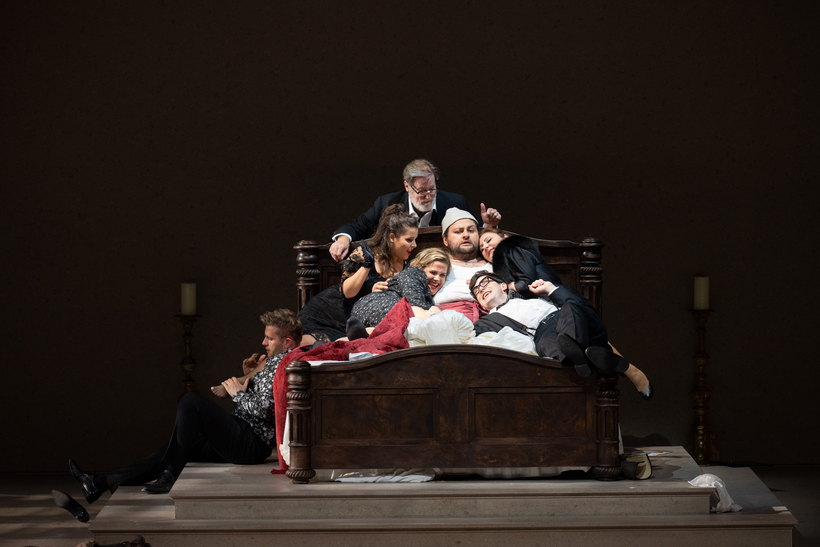’Tis the season to reshuffle Puccini. In May, the Spoleto Festival USA in Charleston, South Carolina, made waves with Yuval Sharon’s Benjamin Button reboot of La Bohème, running the four acts of Puccini’s beloved warhorse in reverse order, so as to end on an up note. In July, the Salzburg Festival followed suit with Christof Loy’s rearrangement of the triple bill Il Trittico, though in this case it meant saving the heartbreak for last.
As envisioned by the composer, the sequence of one-act operas opens with Il Tabarro (The Cloak), a grubby murder story set in the Paris of Émile Zola. Then comes the emotional centerpiece, Suor Angelica (Sister Angelica), the sentimental tragedy of a nun and the love child taken from her at birth. Whereupon we’re sent home with Gianni Schicchi, a wicked farce of estate fraud in the medieval Florence of The Divine Comedy. But no, Loy presents the piece in C-A-B order, beginning with slapstick and ending in tears, with a jolt of noir in between.
At the world premiere of Il Trittico in 1918, the Metropolitan Opera double-cast the Italian tenor Giulio Crimi, then in his first of only three seasons with the company, as the studly stevedore Luigi of Il Tabarro and the starry-eyed boy-next-door Rinuccio in Gianni Schicchi. Few tenors since have followed that precedent.

For the soprano leads, the story is very different. In the original production, the company marshaled three house favorites: Claudia Muzio as Giorgetta, the love-starved wife of a barge captain in Il Tabarro; Geraldine Farrar, Cecil B. DeMille’s silent-screen Carmen (and ex-mistress of Arturo Toscanini), as Suor Angelica; and Florence Easton as Lauretta, the apple of her trickster father’s eye—and of Rinuccio’s. Today, a Trittico trifecta for Meryl Streeps of the opera is totally a thing.
Renata Tebaldi—more celebrated for her “voice of an angel” than for theatrical flair—seems to have paved the way when she recorded Giorgetta, Angelica, and Lauretta in 1962. Beverly Sills—a singing actress par excellence—assayed the complete Trittico live at New York City Opera in 1967, in a single performance collectors know from a private (make that “pirate”) tape.
Since then, rival divas ravenous for a challenge have gone the distance, among them Renata Scotto, Teresa Stratas, Catherine Malfitano, Patricia Racette—and now, Asmik Grigorian of Lithuania, diminutive of stature yet titanic in projection. In 2018, Grigorian knocked Salzburg sideways as Richard Strauss’s teenage princess Salome—so much so that the festival of festivals invited her back for an instant replay in 2019. Under the current rules of engagements, that just doesn’t happen.
This much is certain about Grigorian. Whatever roles she assumes, whatever the demands of the writing, she finds the music in her without apparent physical struggle. She’s always about the total experience, never about the vocal athletics. On an interviewer’s couch, before rolling cameras, she recently fielded questions about the difficulty of creating three such different characters in Il Trittico. “They’re all me,” she replied.
Il Trittico airs at 10 P.M. Central European Summer Time on the Austrian national television station ORF 2. Thereafter, it remains available for streaming on the station archive ORF TVthek, which is accessible to viewers outside Austria over virtual private networks
Matthew Gurewitsch writes about opera and classical music for AIR MAIL. He lives in Hawaii

